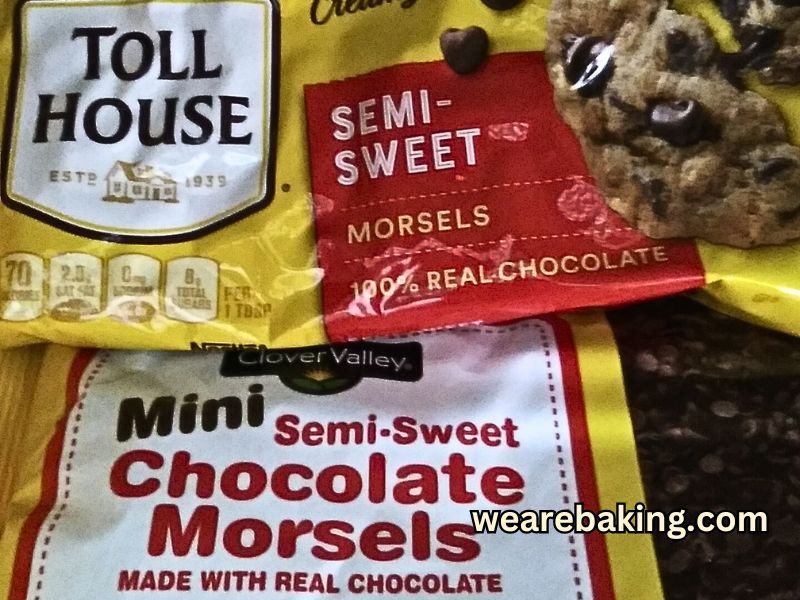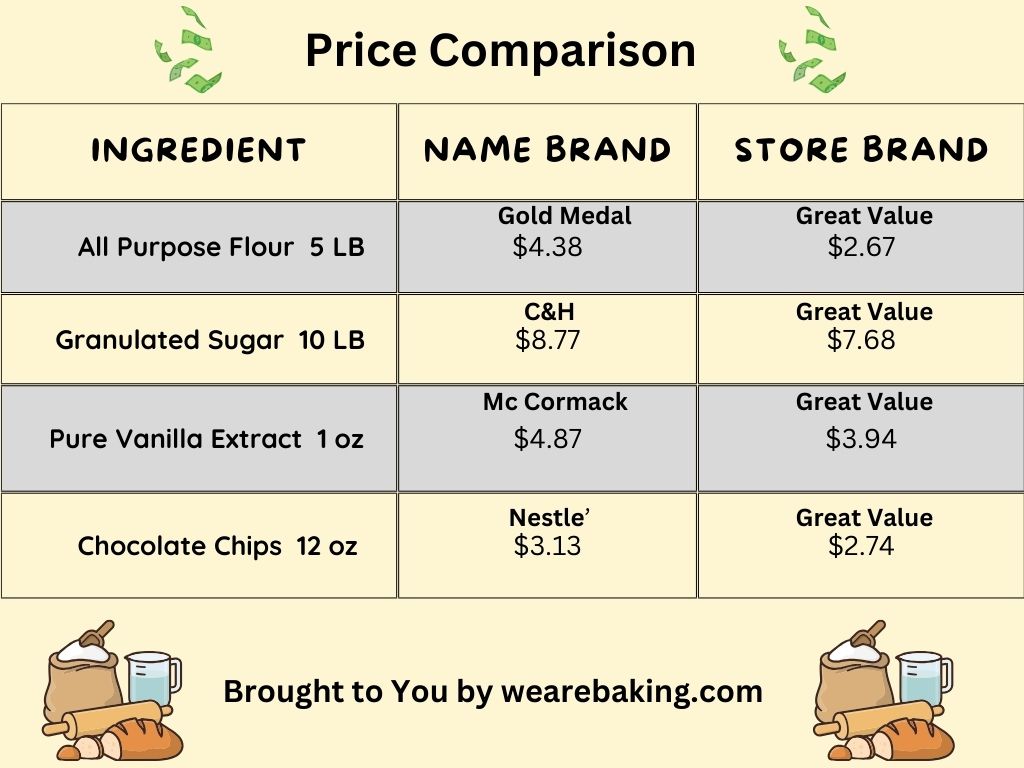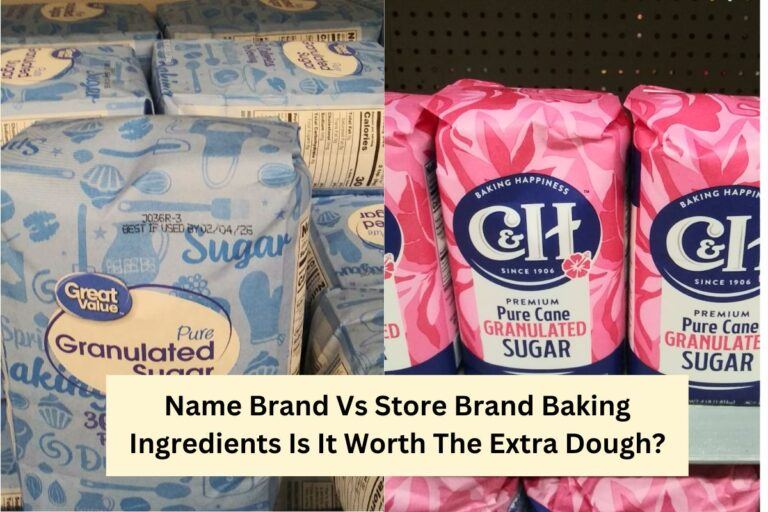Even though store brands might have small differences in quality or how they work in a recipe, you can often get awesome results with your baked items. The main factors when choosing between the two are your baking goals and your budget.
Name Brand vs. Store Brand
The baking aisle can seem overwhelming. You’ve got the big-name brands with their fancy packaging and higher prices. Then there’s the store brand in their plain packaging and lower prices. It’s a silent battle taking place right in front of you, and you’re the one who has to choose
You might think, “Will using store-brand flour mess up my grandma’s famous chocolate cake recipe?” or “Is it really worth splurging on name-brand vanilla extract?” The truth is there is no one-size-fits-all answer. There are pros and cons to both name-brand and store-brand ingredients. There are times when it’s totally fine to go with the store brand option and times when it might be worth investing in a name brand.
When Store Brands Shine



The good news is there are plenty of baking ingredients where store brands can be a total winner. Sugar, for example. Whether you’re using granulated, brown, or powdered sugar, the store-brand version (Great Value ) is likely to be just as sweet as its name-brand equivalent ( C&H).
Basic ingredients like flour, baking powder, and salt from store brands usually work the same as the more expensive name brands in recipes. Just make sure they are fresh and stored right.
Not all store-brand ingredients are created equal. It’s a good idea to compare labels before buying. Be mindful of flour’s protein content. This will vary for different brands. But generally, when it comes to basic baking ingredients, store brands can be a smart choice for your wallet.
Where Name Brands Might Have an Edge


Store brands can be a great choice for many baking ingredients, but there are some cases where name brands might have a slight advantage. Chocolate chips, for example. Some bakers swear by name-brand chips, claiming that they have a richer flavor and melt more smoothly than their store-brand equivalents.
The same goes for cocoa powder. Well-known name brands may use higher-quality cocoa beans and processing methods, resulting in a more intense chocolate flavor and deeper color. Using premium cocoa powder can make a noticeable difference in recipes where chocolate is the star, like decadent devil’s food cake or rich chocolate truffles.
Vanilla extract is another ingredient where name brands might have an edge. Pure vanilla extract can be pricey, but some bakers believe that the flavor is worth the extra cost. I have to admit I prefer the real thing, not imitation. I even make my own vanilla extract.
Certain popular spice brands may offer a more potent flavor profile than their store-brand equivalent. Cinnamon, for example, a well-known brand, might have a more robust and fresher taste than the store-brand alternative. T
The decision to choose between name-brand and store-brand ingredients comes down to what matters most to you and what you like. If you’re a true chocolate lover or really passionate about vanilla, you might want to spend a little extra on the premium name-brand ingredients. But if you’re looking for dependable, everyday ingredients that get the job done, store brands can be a great option.
Other Factors to Consider

When it comes to baking, there’s more to think about than just the brand name In fact, some factors can be even more important than whether you’re using a name brand or a store brand.
The freshness of your ingredients is a big one. That bag of flour that’s been sitting in your pantry for months might not work as well as a freshly bought bag, no matter what the brand. The same goes for things like baking powder and baking soda—if they’ve been sitting around for a while, they might not provide the same leavening power as a fresh batch.
Another thing to consider is how closely you follow the recipe. Even the fanciest name-brand ingredients won’t yield great results if you don’t measure accurately or follow the instructions carefully. Baking is a science, and even small changes to the recipe can greatly influence the final product.
If you’re a frequent baker, buying ingredients in bulk can be a great way to save money without sacrificing quality. Many stores offer bulk bins where you can scoop out just the amount of flour, sugar, or other ingredients you need. This can be a more economical option than buying pre-packaged bags or containers, and it allows you to try out smaller quantities of new ingredients without committing to a full package.
Don’t be afraid to get creative with your ingredient choices. If a recipe calls for a specific type of flour or sugar, try finding a store-brand version that works. You might be surprised at how well it works and how much money you can save.

These prices per Walmart website
The key to baking success is finding what works for you. Whether that means sticking with tried-and-true name brands or experimenting with store-brand options, the most important thing is to have fun and enjoy the process.
Finding Your Baking Sweet Spot
How do you discover what works best for you through the world of name-brand and store-brand ingredients? The answer is experimenting.
Try different brands and see how they work in your favorite recipes. You might find out that you prefer the flavor of a name-brand vanilla extract, but that store-brand bag of chocolate chips works just as well as the more expensive ones.
If you are new to baking, try beginning with store-brand versions of basic ingredients like flour, sugar, and baking powder. These are the main ingredients in most recipes, and using store-brand options can help you save money.
When you become more comfortable with baking, you can experiment with name-brand ingredients for recipes that require a very particular flavor or texture. For example, if you’re making a rich chocolate cake, you might want to splurge on high-quality cocoa powder to really enhance the flavor.
Read the ingredient lists carefully. Look for store-brand options that have similar ingredients to their name-brand equivalents. If the first few ingredients are the same, chances are the products will perform the same in your recipes.
The most important thing is to have fun. Yes, it’s great to try for picture-perfect results, but the joy of baking comes from the process just as much as the final product.
Go ahead and mix and match your ingredients, try out new brands and products, and see what works best for you. With a little experimenting and a lot of love, you’ll soon find your baking sweet spot.
And who knows? You might discover that your secret ingredient has been hiding in the store-brand section all along.
Frequently Asked Questions
If you still have questions about choosing between name-brand and store-brand baking ingredients, don’t worry – you’re not alone! Here are some frequently asked questions that might help.
Q: Are store-brand baking ingredients safe?
A: Absolutely! Store-brand ingredients have to meet the same safety standards as name brands. You can trust that they’ve been produced in clean, well-regulated facilities and are perfectly safe to use in your baking.
Q: Do name-brand ingredients always taste better?
A: Not necessarily! Taste is subjective, and what one person loves, another might not. In blind taste tests, store-brand ingredients often perform just as well as name brands. It’s all about finding what works for your personal preferences.
Q: What if a recipe calls for a specific brand?
A: If a recipe specifically calls for a name-brand ingredient, it’s usually for a reason. Some brands have certain properties that can affect the recipe’s outcome. For example, a specific brand of self-rising flour might have a different ratio of leavening agents than others. In these cases, it’s best to stick with the recommended brand. But if the recipe calls for a generic ingredient like “all-purpose flour,” feel free to experiment with store-brand options.
Q: How can I save money on baking ingredients?
A: There are many ways to save money on baking ingredients without sacrificing quality. A great start is to buy store-brand staples like flour and sugar. You can also look for sales and stock up when your favorite brands are discounted. Buying in bulk can be a great option if you bake frequently, as long as you have proper storage space. And don’t forget about coupons! Many brands offer coupons on their websites or through coupon apps.
Key Learning Points:
- You can often get delicious baking results using store-brand ingredients.
- Name brands may offer slight differences in quality and consistency, depending on the ingredient.
- Consider your baking goals and budget when choosing between name and store brands.
Do you use a store-brand ingredient that works great for you? Or do you have a go-to name brand that you can’t give up? Please leave me a comment below.
And As Always
Keep On Baking!
Taianne
Share the Love

I’m Taianne, the owner and operator behind We Are Baking. Baking my first cake at age 11 hooked me on creating sweet treats. Though my interest faded during childhood, it was rekindled when I married my apple pie-loving husband. I love trying new recipes, tweaking classics, and helping others learn the science and art of baking. I started We Are Baking to share tips, tricks, and favorite recipes I’ve discovered over the years. When not in the kitchen, I enjoy spending time with family and friends. My goal is to inspire others to embrace their creativity through baking. Feel free to contact me with any questions!
Taianne@wearebaking.com

